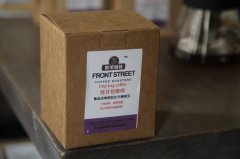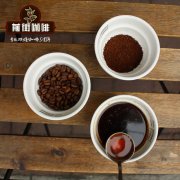Prison coffee or paradise coffee? What's the flavor of Bolivian iron pickup coffee beans?

Professional coffee knowledge exchange more coffee bean information please follow the coffee workshop (Wechat official account cafe_style)
People call Bolivia the closest place to heaven.
Bolivia has lived up to the title.
We naturally expect the coffee beans from Bolivia to have the aroma and purity of heaven.
But in fact, on the contrary, it used to be a "prison coffee" that allowed the tester to cover his nose.
The so-called prison coffee means that there used to be a large number of damp raw beans or eliminated defective beans scattered on the ground every day in large bakeries in the United States. Coffee merchants collected them and sold them at low prices to prisons in the United States for prisoners to drink. (the United States Congress later questioned this inhumane rotten taste of prison coffee).
Bob Stephenson, a California celebrity cup tester, mercilessly pointed out that Bolivian coffee, like prison coffee drunk by prisoners, smells of corruption. Not only the sarcastic cup tester, but also the people who drank Bolivian coffee ten years ago were choked by the sour taste, so the market situation of Bo Dou is very poor. Even New York coffee traders have nicknamed Bolivian coffee beans as "unexpected coffee" whose transaction prices are too low to be lower.
Bolivian coffee cut off by the road of death
Bolivian coffee should not have been so stigmatized.
Bolivia is an alpine country, and the capital La Paz is as high as 3660 meters above sea level. The main coffee growing place in Bolivia is called Yungas (Yangas), which borders the Amazon basin. The elevation is relatively low, about 1500m, but the temperature is quite suitable, with an annual temperature of about 10m, 15 degrees, no frost damage in winter and fertile soil, so it is an ideal place for coffee cultivation.
The problem lies in transportation. In general origin, coffee is grown in dry mountain areas and then transported to the foot of the mountain for post-processing. In contrast, coffee farmers bring wet beans and coffee fruits to the higher capital La Paz for further washing and drying. Search for "Yungas" on the search engine, and the result is "Death Road" (the road to death).
The picture is magnificent, but the reality is not romantic.
"the mountain road is steep, cars and horses are traveling together, and it takes more than 10 hours to get to the processing plant when they encounter traffic accidents. There are many tombstones killed in car accidents along the way, which can be called a spectacle. "because Yangas's coffee industry is the most difficult road to death in the world, and coffee fruits are prone to over-fermentation in the long distance, Bolivian coffee has a choking taste and has become a low-grade product.
Difficulties come to life, unique coffee stunning counterattack.
It's not the worst yet.
To make matters worse, in 2001, when global coffee production was overproduced and coffee farmers fell into complete poverty, they decided to give up coffee cultivation and switch to coca. Bolivians have a tradition of chewing coca leaves to fight hunger, and it is not illegal to grow coca, but international drug traffickers buy large quantities of coca to make cocaine and export it to the United States.
Seeing that Bolivian coffee is about to disappear, the United States Agency for International Development (USAID) suddenly appeared. In order to stop drugs from harming their homes, the United States has decided to spend 500 million US dollars to help Bolivian farmers switch to harmless crops.
The assessment of agricultural experts confirmed once again that Bolivia is a paradise for the development of boutique coffee: high altitude, distinct dry and wet seasons, fully shaded trees and fertile soil, as long as a large washing plant and drying equipment are built near the producing area, the defects caused by delayed washing can be solved.
Bolivian coffee farmers who insist on growing
Marcos Marcos Moreno, a Panamanian coffee agronomist, built a washing plant in the small town of Karanawi and taught farmers how to improve the quality of their coffee. 85 coffee farmers joined together to form a central coffee production association to purchase and handle Tibica coffee from Yangyangas. USAID also spent $150000 to introduce Cup of Excellence (Excellence Cup), a competition most concerned by the world's raw bean merchants, to Bolivia to raise coffee farmers' awareness of boutique coffee. In the first Zhuoyue Cup competition, the total score of 13 boutique coffee bean cups in Bolivia was more than 84, and the champion bean scored 90.44, which was mellow and sweet.
Stephenson, who at first harshly criticized Bolivian coffee as prison coffee, had to sigh: "different, Bolivian boutique coffee is now honey jade liquid."
In the end, the champion beans were sold at $11.25 per pound, which became the sky-high price of Bolivian coffee for 200 years, and the growers finally got a decent reward. Coffee farmers in the Yanggaz basin finally witnessed the example that high-quality coffee beans can become rich. Began to make good use of the God-given high-altitude environment and the advantages of soil and water. In just a few years, the quality of Bolivian beans has been greatly improved, becoming the best competition in the European and American boutique circles every year. With the flavor in the cup that makes us marvel today.
The coffee that knows gentleness, persistence and boldness
The flavor quality has improved, but the production of Bolivian coffee is still very small, and the annual output is now only about 5% of that of neighboring Peru. Backward hardware facilities, high altitude and low yield of iron pickup coffee are all restrictive factors that cause headaches. It is also unknown whether coffee farmers will resist the temptation of coca crops to be four times more profitable than coffee in the future.
On this trip, Mr. Cherry rarely got a batch of washed beans from an organic farm in Bolivia. She chose medium and light roasting that better expresses the flavor of the coffee beans.
"the coffee beans in Bolivia are very dense, hard and full. Medium-light baking, you can drink hazelnut and chocolate aromas, with passion fruit and apple acidity, as well as a hint of rose. At some point, you will think that this bean also has the tenderness of a little woman. "
It is also an imaginative description. How many mountains and valleys it takes for a little woman to be so deep and powerful, light and fragrant.
Fell in hell, lucky to return to heaven, through the ups and downs of the world, and finally bright. The power of this cup of Bolivian coffee is worth remembering.
The future is still unknown, and today's Bolivian iron pickup coffee beans are growing strongly.
END
Important Notice :
前街咖啡 FrontStreet Coffee has moved to new addredd:
FrontStreet Coffee Address: 315,Donghua East Road,GuangZhou
Tel:020 38364473
- Prev

Washed Tibica Coffee beans in Yonggas Town, La Paz County, Bolivia _ Bolivian Coffee Flavor
Professional coffee knowledge exchange more information about coffee beans please follow Coffee Workshop (Wechat official account cafe_style) Bolivia is a landlocked country in South America and a member of the Union of South American Nations. Neighboring countries include Brazil, Peru, Chile, Argentina and Paraguay. The legal capital is Sucre, but the actual seat of government is La Paz, which is above sea level.
- Next

Introduction of coffee beans in Jacinto Titirico Fairview processing Plant of Bolivian Noberto small Farmers
Professional coffee knowledge exchange more coffee bean information please follow the coffee workshop (Wechat official account cafe_style) Bolivian coffee Noberto small farmers batch beauty processing plant products: Typica, Caturra production area: Colonia Siete Estrellas Manor: Jacinto Titirico Haiba: 1600m reason: washing roasting degree: medium baking flavor description
Related
- Detailed explanation of Jadeite planting Land in Panamanian Jadeite Manor introduction to the grading system of Jadeite competitive bidding, Red bid, Green bid and Rose Summer
- Story of Coffee planting in Brenka region of Costa Rica Stonehenge Manor anaerobic heavy honey treatment of flavor mouth
- What's on the barrel of Blue Mountain Coffee beans?
- Can American coffee also pull flowers? How to use hot American style to pull out a good-looking pattern?
- Can you make a cold extract with coffee beans? What is the right proportion for cold-extracted coffee formula?
- Indonesian PWN Gold Mandrine Coffee Origin Features Flavor How to Chong? Mandolin coffee is American.
- A brief introduction to the flavor characteristics of Brazilian yellow bourbon coffee beans
- What is the effect of different water quality on the flavor of cold-extracted coffee? What kind of water is best for brewing coffee?
- Why do you think of Rose Summer whenever you mention Panamanian coffee?
- Introduction to the characteristics of authentic blue mountain coffee bean producing areas? What is the CIB Coffee Authority in Jamaica?

